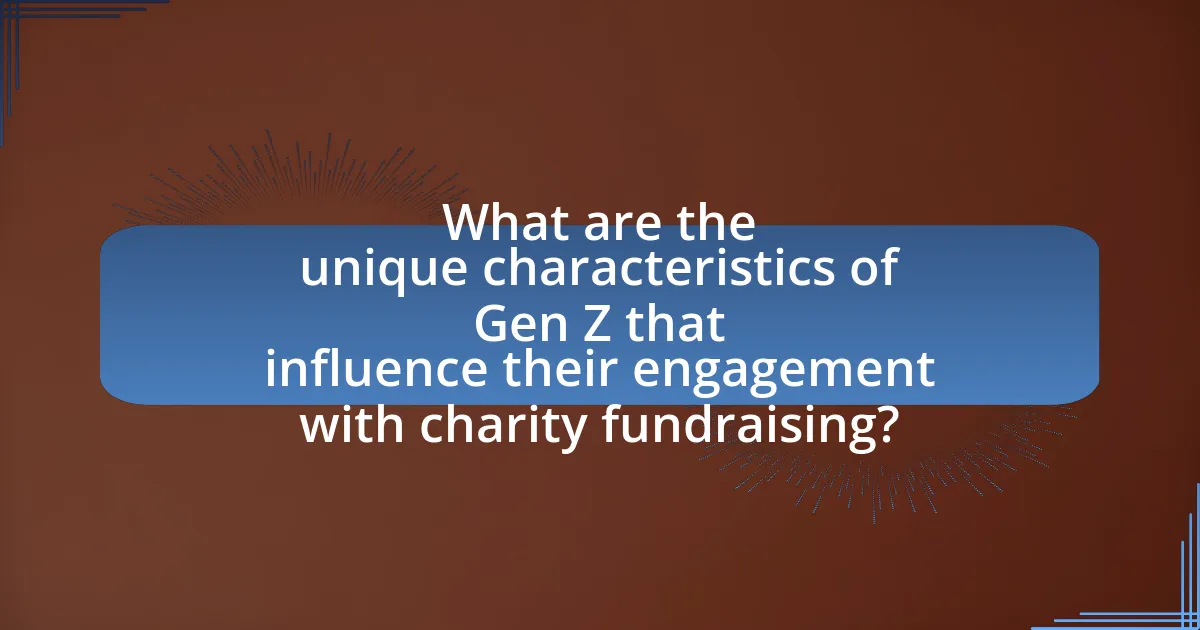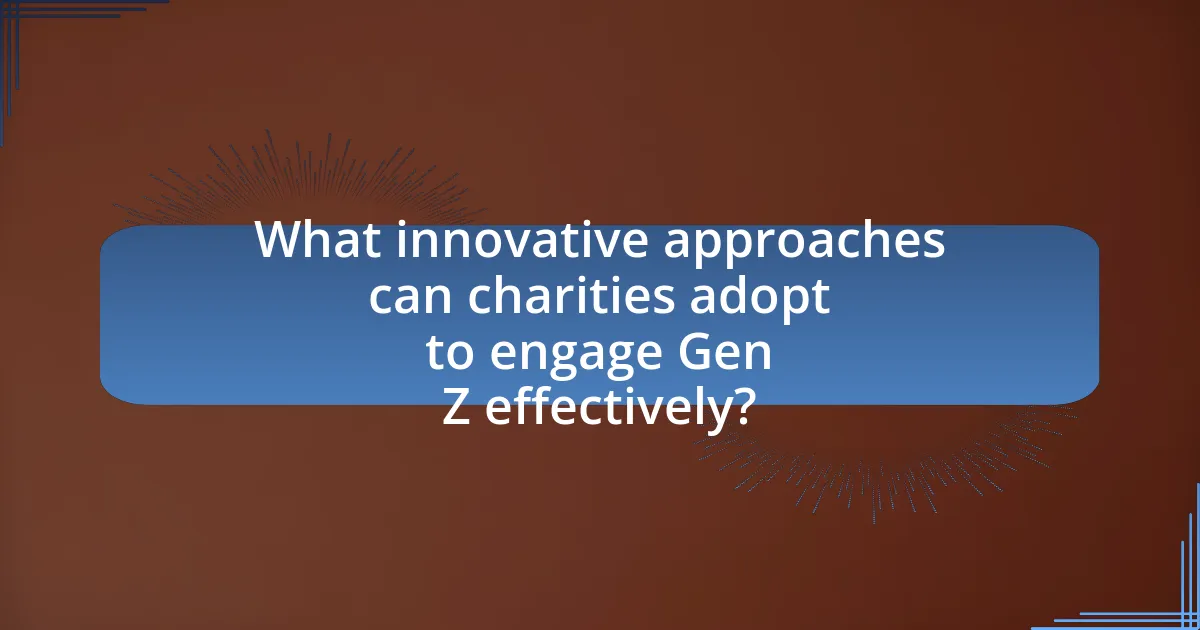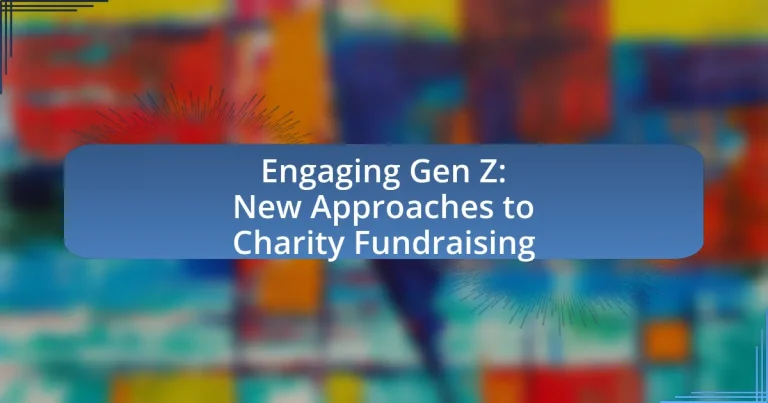The article focuses on engaging Generation Z in charity fundraising, highlighting their unique characteristics such as a strong emphasis on social justice, digital fluency, and a preference for authenticity. It discusses how Gen Z’s digital nativity shapes their approach to charitable giving, favoring online platforms and social media for engagement and donations. Key insights include their preference for transparency and accountability from organizations, the impact of social media on their perceptions of charities, and the importance of storytelling in fostering emotional connections. Additionally, the article outlines innovative strategies charities can adopt, such as gamification and virtual events, to effectively connect with Gen Z donors and maintain their engagement over time.

What are the unique characteristics of Gen Z that influence their engagement with charity fundraising?
Gen Z is characterized by their strong emphasis on social justice, digital fluency, and a preference for authenticity, all of which significantly influence their engagement with charity fundraising. This generation prioritizes causes that align with their values, often seeking transparency and accountability from organizations. According to a 2021 report by the Charitable Giving Report, 70% of Gen Z respondents indicated they would support a charity that demonstrates a clear impact on social issues. Additionally, their comfort with technology allows them to leverage social media for fundraising efforts, making them more likely to participate in online campaigns. This digital engagement is further supported by a 2022 study from the Pew Research Center, which found that 85% of Gen Z uses social media to learn about social issues, reinforcing their connection to charitable causes.
How does Gen Z’s digital nativity shape their approach to charitable giving?
Gen Z’s digital nativity significantly influences their approach to charitable giving by prioritizing online platforms and social media for engagement and donations. This generation, having grown up with technology, is adept at using digital tools to research causes, share information, and mobilize support quickly. For instance, a study by the Charitable Giving Report in 2022 found that 70% of Gen Z donors prefer to give through online channels, highlighting their comfort with digital transactions. Additionally, Gen Z values transparency and authenticity, often favoring organizations that demonstrate clear impact through social media storytelling and real-time updates. This shift towards digital engagement reflects their broader expectations for immediacy and connection in all aspects of life, including philanthropy.
What platforms do Gen Z prefer for engaging with charities?
Gen Z prefers social media platforms such as Instagram, TikTok, and Snapchat for engaging with charities. These platforms allow for visual storytelling and interactive content, which resonate with Gen Z’s preference for authentic and engaging experiences. According to a 2021 report by the Charities Aid Foundation, 70% of Gen Z respondents indicated they are more likely to support causes they discover through social media, highlighting the effectiveness of these platforms in charity engagement.
How does social media impact Gen Z’s perception of charity organizations?
Social media significantly shapes Gen Z’s perception of charity organizations by enhancing transparency and fostering community engagement. Platforms like Instagram and TikTok allow charities to showcase their missions, impact stories, and financial accountability, which resonates with Gen Z’s preference for authenticity. According to a 2021 study by the Charities Aid Foundation, 70% of Gen Z respondents indicated that they are more likely to support organizations that actively engage with them on social media. This demographic values peer influence and often relies on social media for recommendations, making it a crucial tool for charities to build trust and encourage donations.
What values are important to Gen Z when choosing charities to support?
Gen Z values authenticity, social impact, and transparency when choosing charities to support. Research indicates that this generation prioritizes organizations that demonstrate genuine commitment to their causes and provide clear evidence of their effectiveness. A study by the Charities Aid Foundation found that 70% of Gen Z respondents prefer charities that are transparent about their operations and financials, reflecting their desire for accountability. Additionally, Gen Z is inclined to support causes that align with their personal values, such as climate change, social justice, and mental health, emphasizing the importance of relevance in their charitable choices.
How does authenticity affect Gen Z’s trust in charities?
Authenticity significantly enhances Gen Z’s trust in charities. This generation values transparency and genuine communication, often scrutinizing organizations for their ethical practices and alignment with their values. Research indicates that 70% of Gen Z prefers to support brands that demonstrate authenticity, which includes being honest about their missions and the impact of their work. Charities that effectively communicate their goals and show real, measurable outcomes are more likely to gain the trust and support of Gen Z, as they seek to engage with organizations that reflect their own commitment to social responsibility.
What role does social justice play in Gen Z’s charitable choices?
Social justice significantly influences Gen Z’s charitable choices, as this generation prioritizes equity and activism in their giving. Research indicates that 76% of Gen Z believes that social justice issues should be addressed through charitable contributions, reflecting their commitment to causes like racial equality, climate action, and LGBTQ+ rights. This demographic often seeks transparency and accountability from organizations, favoring those that align with their values and demonstrate a genuine commitment to social change.

What innovative approaches can charities adopt to engage Gen Z effectively?
Charities can engage Gen Z effectively by leveraging digital platforms and interactive content. This generation is highly active on social media, making it essential for charities to create engaging campaigns that utilize platforms like TikTok and Instagram to share impactful stories and visuals. For instance, a study by the Pew Research Center indicates that 85% of Gen Z uses social media, highlighting its importance in outreach. Additionally, incorporating gamification elements into fundraising efforts, such as challenges or competitions, can motivate Gen Z to participate actively. Research from the Nonprofit Marketing Guide shows that 70% of younger donors prefer interactive experiences, reinforcing the need for charities to innovate in their engagement strategies.
How can charities leverage technology to connect with Gen Z donors?
Charities can leverage technology to connect with Gen Z donors by utilizing social media platforms, mobile apps, and digital payment systems. Social media, particularly platforms like Instagram and TikTok, allows charities to create engaging content that resonates with Gen Z’s values, such as social justice and environmental sustainability. For instance, a study by the Pew Research Center indicates that 85% of Gen Z uses social media, making it an effective channel for outreach.
Additionally, mobile apps can facilitate easy donations and provide updates on charitable initiatives, enhancing transparency and engagement. Digital payment systems like Venmo and Cash App cater to Gen Z’s preference for quick and convenient transactions, with 60% of this demographic expressing a desire for seamless donation processes. By integrating these technologies, charities can foster a stronger connection with Gen Z donors, aligning with their digital-first lifestyle and philanthropic interests.
What are the benefits of using gamification in fundraising campaigns?
Gamification in fundraising campaigns enhances engagement, motivation, and donor retention. By incorporating game-like elements such as challenges, rewards, and competition, organizations can create a more interactive experience that resonates with participants, particularly Gen Z, who are accustomed to digital interactivity. Research indicates that campaigns utilizing gamification can increase participation rates by up to 50%, as seen in studies conducted by the University of Pennsylvania, which highlight the effectiveness of game mechanics in driving user involvement and commitment. Additionally, gamification fosters a sense of community among donors, encouraging social sharing and collaboration, which can lead to increased fundraising outcomes.
How can virtual events enhance Gen Z’s participation in charity initiatives?
Virtual events can enhance Gen Z’s participation in charity initiatives by providing accessible platforms that align with their digital engagement preferences. This demographic, known for its tech-savviness, is more likely to participate in online events that offer interactive experiences, such as live-streamed fundraisers or virtual auctions. According to a 2021 report by the Charitable Giving Report, 60% of Gen Z prefers to engage with causes through digital channels, highlighting their inclination towards virtual participation. Additionally, virtual events can eliminate geographical barriers, allowing Gen Z to connect with global causes and communities, thus increasing their involvement and contributions to charity initiatives.
What role does storytelling play in engaging Gen Z with charitable causes?
Storytelling plays a crucial role in engaging Gen Z with charitable causes by creating emotional connections that resonate with their values. This generation, known for its emphasis on authenticity and social impact, responds positively to narratives that highlight real-life experiences and the human element behind charitable initiatives. Research indicates that 70% of Gen Z prefers brands that tell stories over those that simply promote products, demonstrating their inclination towards meaningful engagement. By utilizing storytelling, charities can effectively communicate their mission, showcase the impact of donations, and foster a sense of community, ultimately driving participation and support from Gen Z.
How can charities create compelling narratives that resonate with Gen Z?
Charities can create compelling narratives that resonate with Gen Z by focusing on authenticity, social impact, and interactive storytelling. Gen Z values genuine connections and transparency; therefore, charities should share real stories of individuals or communities positively affected by their work. For instance, using social media platforms like Instagram and TikTok to showcase short, impactful videos can effectively engage this demographic. Research from the 2021 “Gen Z and Giving” report by the Lilly Family School of Philanthropy indicates that 70% of Gen Z prefers to support organizations that demonstrate a clear social mission and impact. By incorporating these elements, charities can foster a deeper emotional connection with Gen Z, encouraging their support and involvement.
What are effective ways to showcase impact to Gen Z donors?
Effective ways to showcase impact to Gen Z donors include utilizing social media platforms, providing transparent data, and sharing authentic stories. Social media is crucial as 98% of Gen Z uses it, making it an ideal channel for real-time updates and engagement. Transparency in reporting outcomes, such as specific metrics on how donations are used, resonates with their desire for accountability; studies show that 76% of Gen Z prefers organizations that demonstrate measurable impact. Additionally, sharing authentic stories through videos or testimonials can create emotional connections, as 70% of Gen Z values personal narratives that illustrate the difference their contributions make.

What challenges do charities face when trying to engage Gen Z, and how can they overcome them?
Charities face significant challenges in engaging Gen Z, primarily due to their preference for authenticity and transparency. This generation is skeptical of traditional marketing tactics and demands genuine connections with organizations. To overcome this, charities can leverage social media platforms, where Gen Z spends considerable time, to create relatable content that showcases real stories and impacts. For instance, a 2021 study by the Charitable Giving Report indicated that 70% of Gen Z prefers to support causes that align with their values and can demonstrate tangible outcomes. By focusing on storytelling and community involvement, charities can build trust and foster engagement with this demographic.
What misconceptions do Gen Z have about traditional fundraising methods?
Gen Z often misconceives traditional fundraising methods as outdated and ineffective, believing that these approaches do not resonate with their values or communication styles. This generation tends to prioritize digital engagement and social media-driven campaigns, leading them to underestimate the potential of in-person events or direct mail appeals. Research indicates that while Gen Z values authenticity and transparency, they may overlook the fact that traditional methods can still foster community connections and trust, which are essential for successful fundraising. For instance, a study by the Charitable Giving Report shows that 30% of donations still come from direct mail, highlighting that traditional methods remain relevant despite the rise of digital platforms.
How can charities address the skepticism Gen Z may have towards fundraising appeals?
Charities can address the skepticism Gen Z may have towards fundraising appeals by prioritizing transparency and authenticity in their communications. Research indicates that 70% of Gen Z prefers brands that are open about their operations and impact, which means charities should clearly outline how donations are used and the tangible outcomes achieved. Additionally, utilizing social media platforms to share real stories from beneficiaries can foster a genuine connection, as 54% of Gen Z trusts peer recommendations over traditional advertising. By engaging in two-way conversations and responding to inquiries promptly, charities can build trust and demonstrate accountability, effectively countering skepticism.
What strategies can be implemented to counteract Gen Z’s short attention spans?
To counteract Gen Z’s short attention spans, organizations can implement strategies such as utilizing bite-sized content, interactive experiences, and visual storytelling. Research indicates that Gen Z prefers content that is concise and engaging; for instance, studies show that videos under 60 seconds receive higher engagement rates among this demographic. Additionally, incorporating gamification elements can enhance participation and retention, as interactive formats keep Gen Z engaged longer. Visual storytelling, which leverages images and graphics, can also effectively convey messages quickly, aligning with Gen Z’s preference for visual communication.
How can charities build lasting relationships with Gen Z supporters?
Charities can build lasting relationships with Gen Z supporters by leveraging digital platforms and authentic engagement strategies. Gen Z, known for their digital nativity, prefers communication through social media and interactive content, making it essential for charities to establish a strong online presence. According to a 2021 report by the Charitable Giving Report, 70% of Gen Z donors engage with charities primarily through social media, highlighting the importance of platforms like Instagram and TikTok for outreach.
Additionally, charities should focus on transparency and social impact, as Gen Z values authenticity and ethical practices. A study by the Millennial Impact Project found that 84% of Gen Z respondents are more likely to support organizations that demonstrate a clear commitment to social issues. By sharing stories of impact and involving Gen Z in decision-making processes, charities can foster a sense of ownership and loyalty among these supporters.
What are the best practices for maintaining engagement with Gen Z over time?
To maintain engagement with Gen Z over time, organizations should prioritize authenticity, utilize social media effectively, and foster community involvement. Authenticity resonates with Gen Z, as they prefer brands that are transparent and socially responsible; for instance, 76% of Gen Z consumers are more likely to purchase from brands that demonstrate a commitment to social issues. Effective use of social media platforms, particularly TikTok and Instagram, allows organizations to create engaging content that aligns with Gen Z’s interests and values. Additionally, fostering community involvement through interactive campaigns and opportunities for participation can enhance loyalty, as 70% of Gen Z values brands that encourage social activism. These practices collectively ensure sustained engagement with this demographic.
How can feedback from Gen Z improve charity initiatives?
Feedback from Gen Z can significantly improve charity initiatives by providing insights into their values and preferences, which are crucial for effective engagement. Gen Z prioritizes authenticity, transparency, and social impact, and their feedback can guide charities in aligning their missions with these values. For instance, a study by the Charities Aid Foundation found that 70% of Gen Z respondents prefer to support organizations that demonstrate clear social responsibility. By incorporating Gen Z’s perspectives, charities can enhance their outreach strategies, develop relevant campaigns, and foster a sense of community, ultimately leading to increased participation and donations.
What practical tips can charities implement to effectively engage Gen Z in fundraising efforts?
Charities can effectively engage Gen Z in fundraising efforts by leveraging social media platforms and creating interactive content. Gen Z, known for their digital nativity, spends a significant amount of time on platforms like Instagram, TikTok, and Snapchat, making these channels ideal for outreach. Charities should utilize storytelling techniques that resonate with Gen Z values, such as authenticity and social justice, to create compelling narratives around their missions.
Additionally, incorporating gamification elements, such as challenges or competitions, can enhance engagement, as studies show that interactive experiences increase participation rates among younger audiences. For instance, a report by the Charitable Giving Report 2022 indicated that campaigns featuring interactive elements saw a 30% increase in donations from Gen Z compared to traditional methods.
Moreover, charities should prioritize transparency and provide regular updates on the impact of donations, as Gen Z prefers to see tangible results from their contributions. By adopting these strategies, charities can foster a deeper connection with Gen Z and enhance their fundraising efforts.


